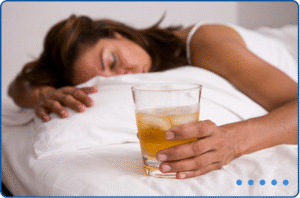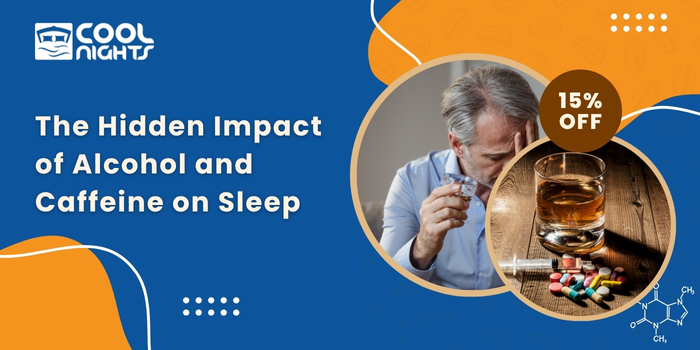Sappiamo tutti che una buona notte di sonno è essenziale per sentirsi riposati, concentrati e in salute. Ma a volte, nonostante un letto comodo e una routine notturna perfetta, un sonno ristoratore sembra ancora fuori portata. Uno dei motivi più trascurati? L'alcol e la caffeina, due delle sostanze più comunemente consumate che possono tranquillamente sabotare il ciclo del sonno.
In questo blog esploreremo il modo in cui l'alcol e la caffeina influenzano i ritmi naturali del sonno, la scienza che sta alla base del loro impatto e cosa si può fare per ridurre al minimo i loro effetti, soprattutto se abbinati alle soluzioni di raffreddamento intelligenti di CoolNights.store.
Come la caffeina disturba il sonno
La caffeina è lo stimolante più diffuso al mondo, presente in caffè, tè, bevande energetiche, cioccolato e persino in alcuni farmaci. Agisce bloccando l'adenosina, un neurotrasmettitore che favorisce il sonno e il rilassamento. Sebbene la caffeina contribuisca ad aumentare la vigilanza durante il giorno, la sua lunga emivita (fino a 6-8 ore) significa che può rimanere in circolo fino a sera.
Anche se non ci si sente nervosi, la caffeina può esserlo:
-
Ritardo nell'inizio del sonno (ci vuole più tempo per addormentarsi)
-
Ridurre il tempo totale di sonno
-
Diminuzione degli stadi del sonno profondo (in particolare del sonno a onde lente)
-
Aumentano le probabilità di svegliarsi durante la notte
Suggerimento: se siete sensibili alla caffeina, provate a interromperla dopo le 14 e a passare ad alternative senza caffeina la sera.
Alcol: L'illusione di dormire meglio
Molte persone usano l'alcol per "rilassarsi" la sera. Se è vero che inizialmente l'alcol può dare sonnolenza e far addormentare più velocemente, questo effetto è di breve durata. L'alcol disturba la seconda metà del ciclo del sonno, riducendo il sonno REM, fondamentale per il recupero mentale e l'equilibrio emotivo.
Gli effetti comuni dell'alcol sul sonno includono:
-
Risvegli notturni
-
Sogni o incubi vivaci
-
Aumento del russamento e del rischio di apnea notturna
-
Disidratazione e surriscaldamento
Infatti, l'alcol agisce come vasodilatatore, dilatando i vasi sanguigni e aumentando la temperatura corporea. Questo può causare sudorazione notturna e malessere generale, soprattutto nei mesi più caldi.
Il ruolo della temperatura corporea nel sonno
Il corpo si raffredda naturalmente prima di andare a letto come parte del ritmo circadiano. Quando sostanze come la caffeina e l'alcol interrompono questo processo di raffreddamento, stimolando il sistema nervoso o interferendo con la termoregolazione, il sonno ne risente.
Ecco perché mantenere una temperatura ottimale durante il sonno è fondamentale. CoolNights.store offre soluzioni di raffreddamento a base d'acqua, come il CoolMattress e il CoolPillow, progettati per aiutare a regolare la temperatura corporea e favorire un sonno ininterrotto, anche quando fattori esterni (come un bicchierino da notte o il caldo estivo) cercano di disturbarlo.
Come dormire meglio anche se si beve caffè o vino
- Non è necessario rinunciare alla propria bevanda preferita per dormire bene, ma i tempi, la moderazione e l'ambiente sono fondamentali.
- Limitare l'assunzione di caffeina dopo la metà del pomeriggio.
- Evitare l'alcol 3-4 ore prima di andare a letto per consentirne la metabolizzazione.
- Idratarsi adeguatamente, soprattutto dopo aver consumato alcolici
- Creare un ambiente favorevole al sonno: utilizzare cuscini rinfrescanti, biancheria da letto traspirante e ridurre al minimo il tempo trascorso davanti allo schermo.
- Ascoltate il vostro corpo: notate come dormite dopo aver bevuto e regolatevi di conseguenza.
Caffeina e alcol possono essere abitudini quotidiane, ma il loro impatto nascosto sul sonno potrebbe costarvi più di quanto pensiate, in termini di energia, umore e salute a lungo termine. Facendo attenzione a come e quando li consumate e creando un ambiente più fresco e favorevole al sonno, potete riprendere il controllo del vostro riposo.
Noi di CoolNights.store crediamo che un sonno migliore inizi con la consapevolezza e finisca con il comfort. Dite addio alle notti agitate e date il benvenuto a un sonno più profondo e fresco.


